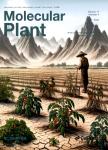Global Analysis of Expression Profiles of Rice Receptor-Like Kinase Genes
Global Analysis of Expression Profiles of Rice Receptor-Like Kinase Genes作者机构:National Key Laboratory of Plant Molecular GeneticsInstitute of Plant Physiology and EcologyShanghai Institutes for Biological Science(SIBS)ChineseAcademy of Sciences300 Fenglin Road20032 ShanghaiChina
出 版 物:《Molecular Plant》 (分子植物(英文版))
年 卷 期:2012年第5卷第1期
页 面:143-153页
核心收录:
学科分类:0710[理学-生物学] 090601[农学-基础兽医学] 07[理学] 09[农学] 0906[农学-兽医学] 071007[理学-遗传学] 0901[农学-作物学] 0902[农学-园艺学]
基 金:中国科学院项目 The Shanghai Institutes for Biological Sciences
主 题:Receptor-like kinase rice profiling seed development stress ABA.
摘 要:The receptor-like kinases (RLKs) play critical roles in plant development and response to stress stimuli. By perceiving or sensing the extracellular signals, RLK activates the downstream signaling pathway through phosphorylating the specific targets. Up to now, only a few RLKs have been functionally identified, which are even fewer in rice (Oryza sativa L.). We here report the systemic analysis of the expression profiles of rice RLK coding genes in different tissues, with the emphasis on seed development and in response to both abiotic stress and plant hormones. The results showed that most rice RLK genes are expressed in two or more tissues, of which the RLCK-RLKs have a higher, while WAK- and SD-RLKs have a lower, expression level in the vegetative tissues than other subfamily members. Interestingly, the constitutively highly expressed RLKs in rice and Arabidopsis are conserved, which is consistent with the previous hypothesis that RLKs existed before the differentiation of monocotyledon and dicotyledon plants. Nearly one-third of the detected rice RLKs are expressed during seed development, and the RLCK-RLK members possess a higher percentage during the endosperm de- velopment, suggesting a novel function of RLCK-RLK members in endosperm development. Further analysis revealed that many RLK genes expressed during seed development are also regulated by abiotic stresses (cold, salt, or drought) or hor- mones, indicating that RLKs may take part in the stress-related signaling pathways such as dehydration of endosperm. These results provide informative insights into the RLK studies and will be helpful to reveal the global regulatory network controlling rice seed development.



